#Language evolves
Explore tagged Tumblr posts
Text

58 notes
·
View notes
Text
Something occurred to me about neopronouns. I was talking with a friend who uses he/they about pronouns and how they think their pronouns are boring, while I think it’s nice that he has pronouns that are socially recognized as pronouns whereas my e/eir/em use gets multiple questions and debates. Despite them being around for over a century. Which made me think about words that entered the English language in the last 100 years. That people use without batting an eye.
So here’s my (slightly bitter) list of words to use the next time someone says they can’t wrap their head around older words:
- TV/ television
- microwave (yes technically the word existed, but not in the modern definition)
- bikini (again, only the Atoll existed until the invention of the clothing garment)
- LCD (the words existed separately, but never as an acronym together)
- computer (which changed definition from a human to a machine)
Feel free to add more. I only gave this a few seconds of thought so I might add more later
9 notes
·
View notes
Text
It’s wild how young some words are, or, maybe, how old I am xD
Anyway, here’s a link to Merriam-Webster’s website for what year a word first showed up in print. (English only, I think, feel free to share if you know of other languages for this!)
But some of these floored me because I didn’t realize certain concepts and technologies were coming into print the same year I did 😳
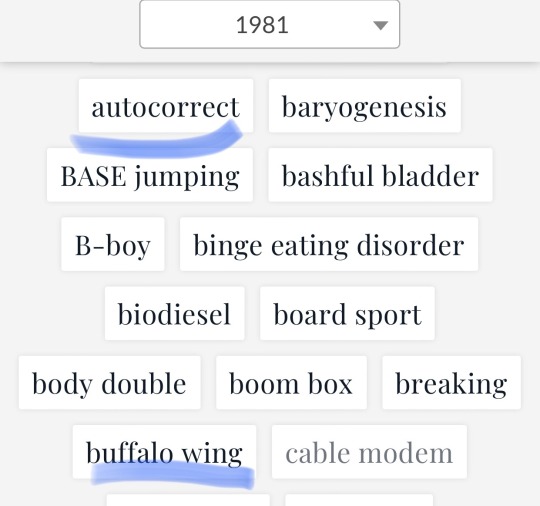
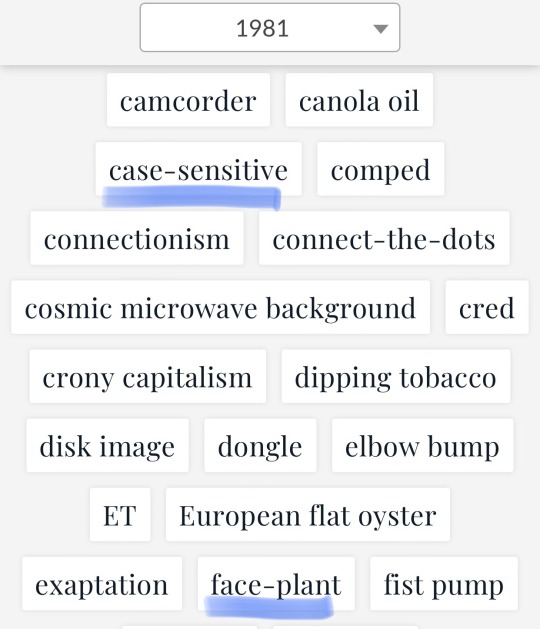
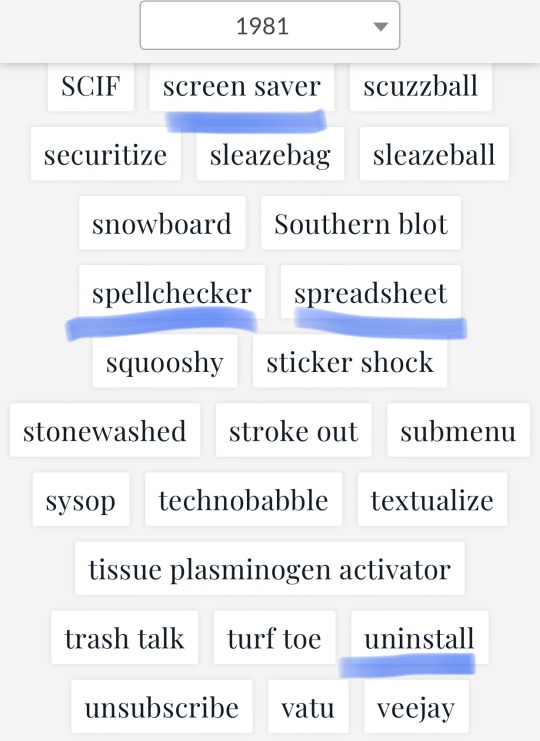
Lookup what year you were born and see what words surprise you.
#quin muses#word debuts#I cannot stress how unimportant a word’s age is to it’s validity#language evolves#and it should.
3 notes
·
View notes
Text
If we learned anything from 2024 American Dialect Society Word of the Year "rawdogging", just because the initial use of a term was sexual, that for mean it can't expand through usage.
I cannot begin to explain to you the disappointment I felt on finding out that “match my freak” was a sexual thing and not a level of how insane you are with your friends
13K notes
·
View notes
Text
.
#when you should really be sleeping since hours ago so you can run a good dnd session tomorrow but then suddenly you realize#somewhere down the line you messed up the names of your moons and now an important religious motive makes no sense anymore#but your players already know and have tied their own stories to the moons#shit#I mean it's fine#language evolves#the name is still close enough#fuck me though#I'm going to be running on maximum 5 hours of sleep tomorrow#again
0 notes
Text
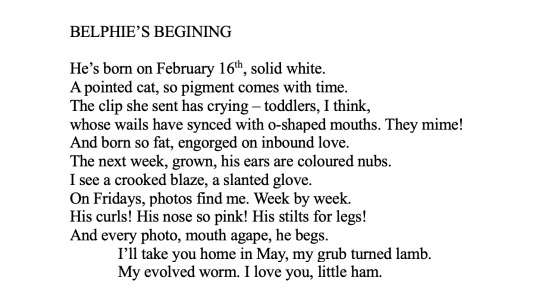
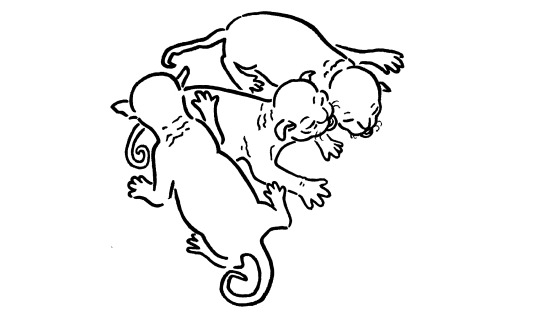
#AHHH I dunno if this is shit or not#or whether my language is clear enough that people actually know what I'm talking about#but 'evolved worm' has stuck in my head. I like that bit.#little fuckign thing. little ham. monster animal. worm.#anyway yeah this is my attempt to do a sonnet with proper meter#it's from the beginning of the chapbook. I tried to tell things chronologically#so I needed one from before I brought him home#Belphegor
3K notes
·
View notes
Text
i would argue that a lot of the words that are traditionally considered swear words, fuck, shit, cunt, etc etc are not really the taboo words they once were, and we have new swear words now. ones that i certainly won't repeat. ones that are actually offensive to marginalised groups. i think those things being taboo is far more important than..... words like fuck. Oh no, a reference to intercourse! How vulgar.
You know what really fucking Annoys Me about internet censorship is stuff like swear words being heavily censored because that's entirely an American cultural hangup being forced on the rest of us. I don't know a single country where swearing is as taboo as it is in America. In fact most languages have swear words that would have the same effect on an American as giving a Victorian chimney sweep a pepsi max cherry.
136K notes
·
View notes
Text

oh shit metal stole tails' speak & spell
#sonic the hedgehog#sth#metal sonic#sonic fanart#miles tails prower#ive done nothing but draw metal for like a week straight.#idk man something about him!! can't stop thinking about this robot#ok so technically this is a part of the story that lives in my head where belle and metal keep running into each other#and every time they meet metal has developed a new way to express himself#starting w writing in the dirt. then he steals the speak and spell. then he starts to learn a form of sign language#bc i think communication is an element that's really important to metal's evolution as a character#like. there must be a reason why metal gave himself a voice the one time he tried to evolve past eggman as neo#idk. many thoughts but not enough coherent words to articulate.#robot :)#art#my art#weaverofink
184 notes
·
View notes
Text
Living together.
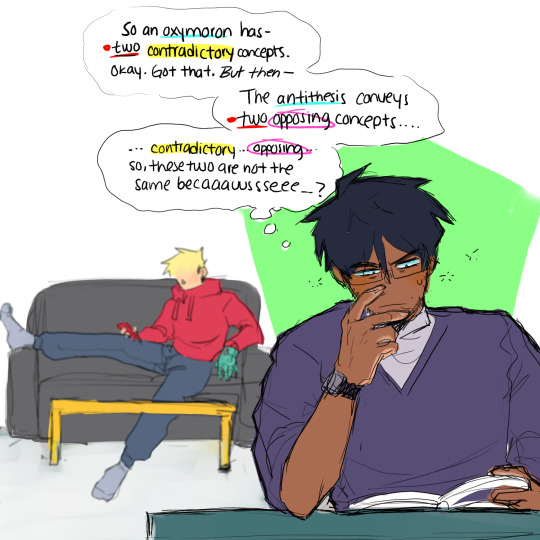





The snail video if you are interested :)
#showing random videos you found abt an animal fun fact is a love language if you didn't know btw#not understanding a topic and starting with drop out ideation is part of the journey when you are a student.#it evolves later (or simultaneously) with wanting to quit your job. in WW case both apply at the same time#vash is the kind of guy to really be marveled abt every little new piece of information he gets in his hands#and the 1st person he thinks abt to share his knowledge and joy with is ofc ww#the fact that they live together only amplified this by a thousand#ww tends to hear him out and also watch more videos with him. rn he's too busy weighing studying vs quitting#I really enjoyed drawing Vash in the bg for this one he's so cute#i hope its noticeable how much fun i am having by putting them through all of this.#why didn't i do this more since earlier???#aesthetics be damned. put them THROUGH -IT-#trigun#vash the stampede#trigun stampede#nicholas d wolfwood#vashwood#trigun fanart#vash#wolfwood#nicholas trigun#lenssi draws#Trigun Uni! AU#made some very light changes that were bothering only me specifically. you might not notice IWDFJK
499 notes
·
View notes
Text
"Why is English so full of irregular verbs and counterintuitive pronunciation" because we made a deal with the devil in exchange for ungendered nouns* and a one-size-fits-all definite article.
"It wasn't worth it" as I said. A deal with the devil.
*except ships.
#language memes#linguistic memes#yes i know english has evolved over time this is a joke not a history post#literature memes
61 notes
·
View notes
Photo
Raspberries are a popular fruit common in 21st century grocery stores. They are often sold in recyclable, single use, plastic cartons. While they are in season in the mid to late summer, they are often sold year round in grocery stores, with their prices rising when out of season.
Raspberries can be eaten raw, or baked into jams/sauces, or mixed into smoothies, or used as decorative edible finishes for dessert items. Raspberry jams are often served with chocolate. They are extremely convenient to eat as they do not require peeling and their seeds are easily digested without issue.
Raspberries are usually juicy, and quite sweet with a hint of sour, though the particular flavor varies based on how ripe they are.
Denizens of the early twenty-first century will know what raspberries are. It might even be their favorite fruit.

~ Red and Green ~
#period novel details#I am well aware that raspberries are not true berries#but the botanists are WRONG on this one#the culinary definition of berry is the true definition#I don't care if a 'banana' is technically a 'berry'#a banana is NOT a berry#language evolves#you LOST that language war botanists!#admit defeat and enjoy a mixed berry smoothie!
1K notes
·
View notes
Text
Trying to brainstorm ways for electroreception based languages could work practically (spec bio wise, not humans lol), but the range for it sensory wise seems pretty limited (compared to vocal and visual communication which you dont need to be right beside a person to communicate with them)
#i guess tactile language is a thing too#but idk if that would evolve as a primary way of communication unless in an environment where hearing and vision couldnt be relied on..
89 notes
·
View notes
Text
It's a minor detail but I'm so emotional over Doctor Who making the universal human language in the future based on Cantonese.
#doctor who#doctor who spoilers#listen there are a whole lot of loaded implications around the idea of a universal human language which i'm well aware of#but insofar as sci fic/fantasy stories have the concept of a human 'basic' language#it's almost always based on english/thinly evolved english#so to have doctor who make it cantonese is hitting me real hard in the emotions#especially because i've had so many conversations with cantonese elders about how they're afraid for the survival of the language#because even though the cantonese-speaking diaspora is huge; future generations are so often de-incentivized to know cantonese
209 notes
·
View notes
Text
White person making fun of aave but chalking it up to "weird" tiktok speech & then defending themselves by saying its about "how language evolves" when rightfully told that what they just said was antiblack

#these bitches always reach for the 'language evolving' bullshit excuse#yes tell us your expertise knowledge on aave and its historic & current evolution White person. I'm sure you know lots#please do so without giving an incorrect definition of aave words. quickly
88 notes
·
View notes
Text
Okay but, you do understand that what you have described with how ravage is being used now is how ravish was being used back in the 19th century. As you said, "ravish" used to mean to rape and now it does not. What you're seeing is in real time the process that a language goes through to add a different meaning to a word.
Language changes. Evolves. Words that meant one thing in the past means something else completely now. And this literally is how language does that. It's done it with "literally" which now has the meaning of figuratively in it's definition. Look at the second meaning.
This isn't a homophone situation where somebody has confused "waste" with "waist" and "vial" with "vile." And while some people might be using it "incorrectly" if the meaning is able to come through without breaking the majority of readers' immersion then the author hasn't failed. They have communicated their thoughts effectively. Which is really all language is.
Being pedantic about language and grammar throws up barriers to authors which really can stifle an emerging artists growth. There is proof of this, and it even showed up in an episode of Adam ruins everything about school. https://www.trutv.com/shows/adam-ruins-everything/season-2/episode-6/adam-ruins-what-we-learned-in-school
Let the person whom the artist has chosen be the one to help shape their story. In the case of a novel that has been written for monetary gain AKA published on places like Amazon or Barnes & Noble or Apple, then it is your right as a reader to point out in a review that the author has you feel used language incorrectly and might benefit from a better copy editor. But I am going to tell you that as a professional editor that this "error" is not really that big of a deal. I likely would flag it if I were doing a copy of it with a question of "did you mean x word?" But if the author chose not to change it I wouldn't lose any sleep over it.
One final point I want to make has to do with how writing is being done nowadays. Many authors, including professionals, are writing using talk to text whether it be through a program like Dragon or on their phone. And these programs are ridiculously terrible at understanding words that come out of people's mouths. In fact, I am currently using my phone to write this post, and I have had to go back numerous times to correct something weird that talk to text has gotten it wrong. Additionally, as @thebibliosphere has pointed out, programs such as Grammarly, pro writing aid, and even Microsoft's built-in grammar & spell check are now flagging things that are correct as incorrect. And in some cases even changing things without the author's permission. I have absolutely had my word processing program make changes to something I was typing. It did it as I was typing this. And I have had to go back to change it because I either wanted the incorrect or what it changed it to was not what I was trying to type. But many people trust these programs to be correct. They trust them more than they trust themselves. So in some instances you might be penalizing an author who really did mean to use the correct word but either the program in which they are typing changed it/messed it up or the program that they use to help keep their language consistent screwed them over. It happens. I see it everyday.
I guess ultimately what I'm trying to say is that language evolves and it's important be tolerant toward your fellow authors. This goes quadruply so for authors who are creating fanworks.
And that's all I got to say about that.
Ravage /= Ravish and I am begging every writer to learn the difference
In its current sense, ravish means "to overwhelm someone sensually or sexually." Before the 20th century it meant "to rape," and more originally "to seize and carry off." Today ravishing someone, or part of someone if you want to use it as a transitive verb, means you're making someone feel overpowered or overcome by the intensity of your erotic attentions.
Ravish no longer denotes or connotes nonconsent or any unwillingness on the part of target (unless you use it as an intransitive verb and make it clear from context that you mean it in the old-timey rapey way), but its history as a word for rape leaves it with two unavoidable connotations and an optional third:
That the ravisher is inflicting something on their partner, and it's overpowering. Submission, pleasure, love, affection, sensation. Kisses, touches, worship.
That the action the ravisher is performing will leave their partner in a weaker state than they were before. Someone who has just been dealt with ravishingly is left debauched, wrecked, undone, forgetting themselves, overwhelmed.
That the ravisher is taking something from the being ravished or forcing them to give something. This connotation only appears if you use words and show actions around your use of ravish to show that this is what you mean. The result is despoiled.
Meanwhile ravage means "to destroy" or "to cause extensive damage to." Devastate is its closest synonym in meaning per Merriam-Webster. Ravaging is what bears and tigers and big sharks do to people and what hurricanes and forest fires and dragons do to cities. It is not inherently a sexual word: if you are ravaging a person, you are causing them grievous physical harm.
Unless your character is literally tearing off their partner's lips, they're probably ravishing their partner's mouth with kisses. Unless they're ripping out chunks of scalp, their fingers are probably ravishing their partner's hair. They kiss and bite their way up their partner's throat ravishingly. But! When they've finished fucking, the bed and sheets may be ravaged.
I know ravage has become a popular verb to use to describe intense erotic actions, but I am begging you, writers--on my knees if that's how you want me--to resist the conflation of these two terms! They're both valuable words with distinct meanings, connotations, and echoes, and collapsing them into one meaning doesn't just add a weird jarring note of severe injury to your sex scene, it robs you as a writer of two gorgeous, terrible, fascinating words.
#language#language evolves#linguistics#look I'm not calling you out#but you aren't the first person who I've seen gatekeep in this way#and gatekeeping doesn't help anyone#signed a professional editor
107 notes
·
View notes
Text
The thing about romance novels is that everyone loves to hate on them but they WILL save your life if you let them
#*info dumps about the history and evolution of romance novels*#*defends dubcon kidnap fantasy book*#*tangent about the way language in romance novels has evolved and how the very vernacular of them is in conversation with all that came befo#re*#I saw someone use a word in a very specific way in this book I was reading today and my heart skipped a beat#because I was like oh! I know where that came from. I know which book taught you that#:')
38 notes
·
View notes